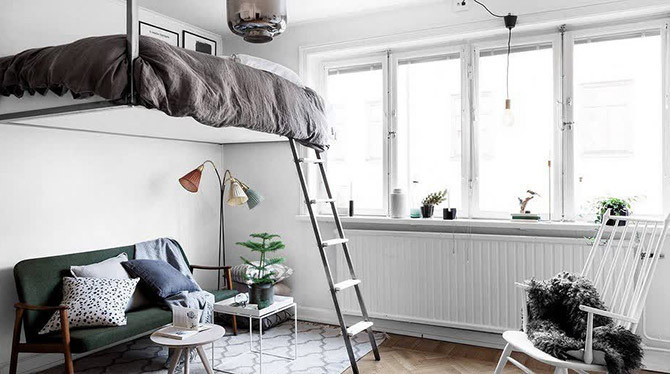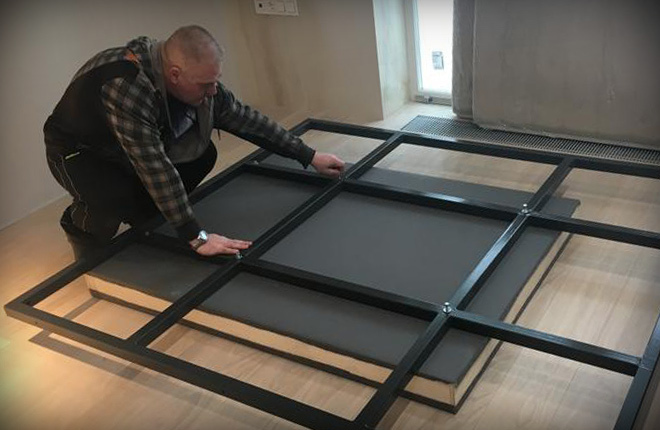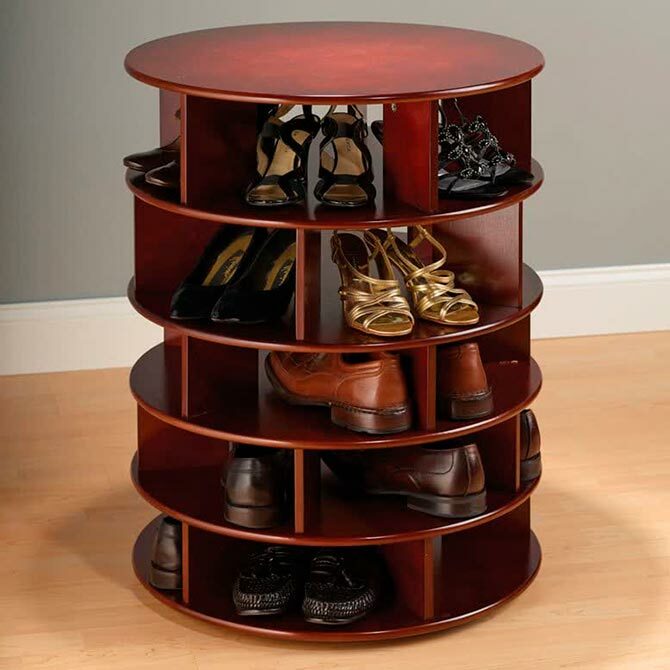When choosing kitchen furniture, special attention should be paid to the countertop. The material from which it is made directly determines the service life of your kitchen, because the countertop is the main working coating, it must be resistant to mechanical damage, high temperatures, to the water. Moreover, it should be easy to clean and easy to clean. And of course, it should be attractive in appearance and be the perfect complement to kitchen fronts. In this review, I will try to answer the question of how to choose a countertop for the kitchen and what to pay special attention to?
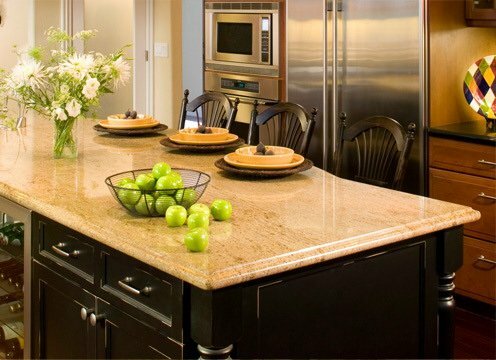
Material selection
The first thing to look for when choosing a kitchen table is the material. It can be divided into two groups - natural and artificial.
Attention! Earned on our website kitchen designer. You can familiarize yourself with it and design your dream kitchen for free! May also come in handy wardrobes designer.
Natural
These include:
- Wood
Most often it is oak, beech or teak. It is expensive, beautiful, but difficult to maintain - the tree must be rubbed with special compounds with oils and not use household chemicals when cleaning;
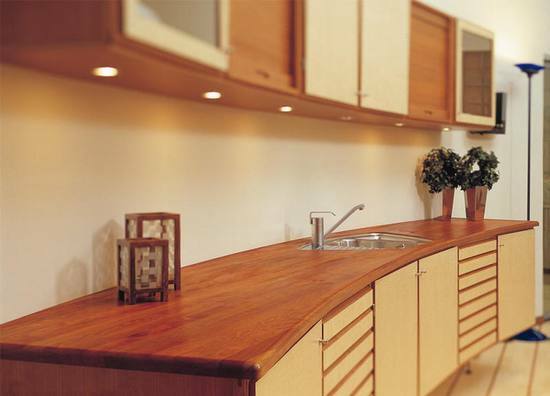
- A rock
Usually it is granite - the most dense and least hygroscopic (i.e. water-absorbing) rock. It is considered a special chic to make a countertop from marble, but this is impractical, since it is soft and scratches quickly;
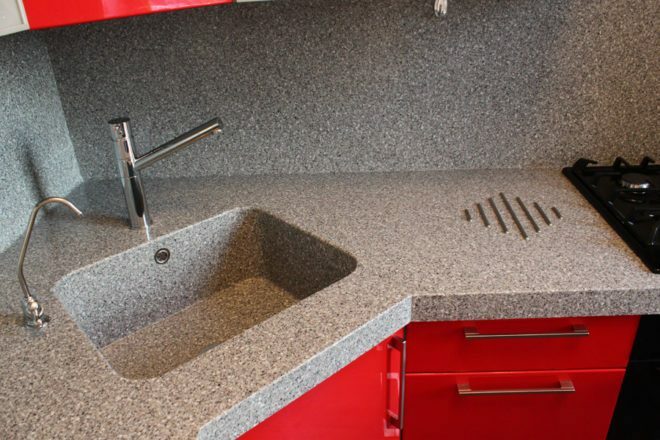
Natural materials are much more expensive and require special care. Modern artificial materials are not only not inferior, but also surpass them in quality and visual characteristics.
Artificial
- Chipboard
Laminated particle boards. They can be of any color and texture. Good materials very faithfully imitate natural wood and stone, but they are less wear-resistant;

- Fake diamond
These are liquid polymers with multi-colored granules that imitate stone. Since this is a liquid base applied to plywood, this material is in demand where a curved tabletop is needed without straight and sharp corners;
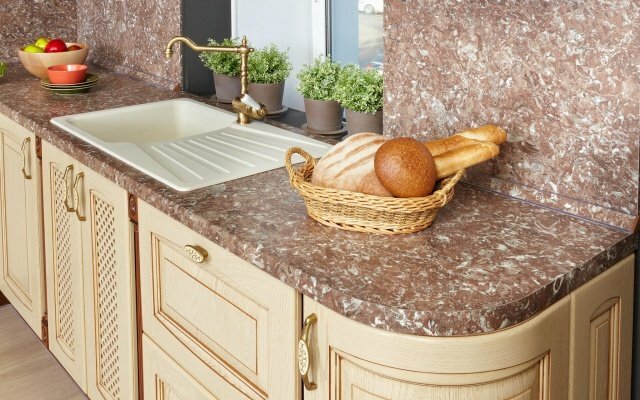
- Agglomerate
This material is similar to the previous one, but here chips of natural material, such as quartz, glass, mirror or granite, are mixed into the liquid polymer. Such a surface is not hygroscopic (unlike natural stone) and less fragile (as opposed to artificial).
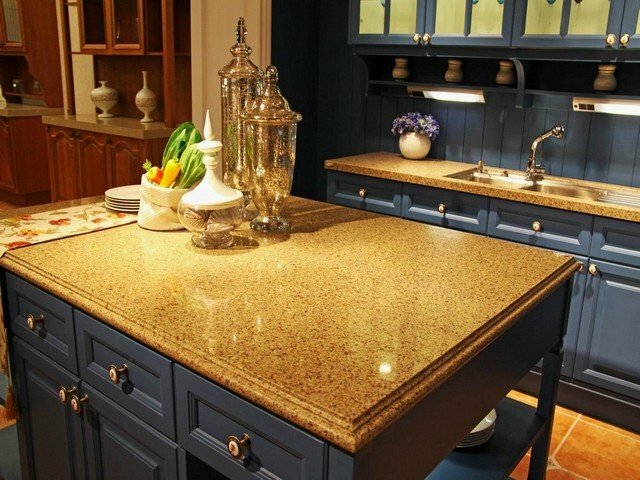
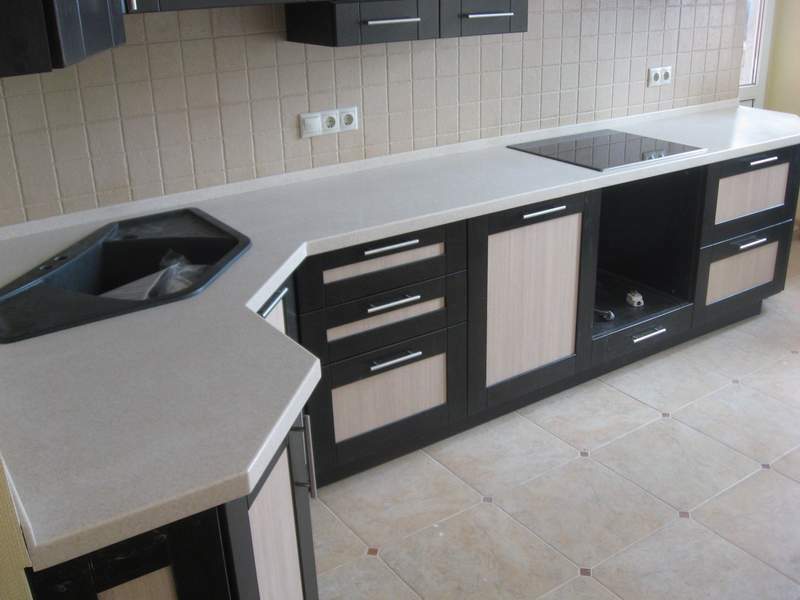
How do you choose the best option?
If you are not constrained in funds and want all the best for your kitchen, then choose natural materials - for a classic or country kitchen, warm wood (more here), and for high-tech or minimalist style, a cold but wear-resistant stone. However, these materials require maintenance, both of them are afraid of excessive amounts of water.
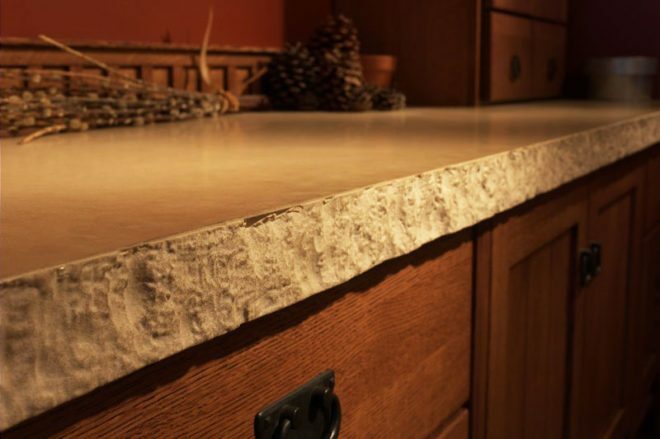
If you are not ready to keep an eye on the condition of the countertop and take care of it all the time, then the ideal option for the kitchen is an agglomerate. It is not hygroscopic, durable and looks like real marble. However, unlike natural, it is warm and pleasant to the touch.
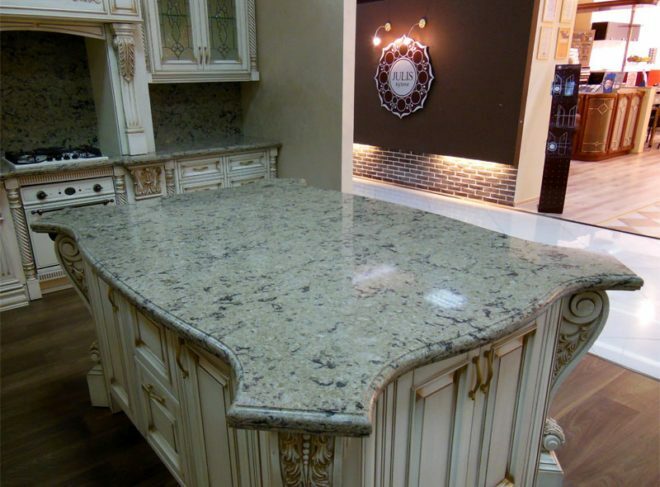
If you want to save a little, then choose an artificial stone. This option has no joints, but the basis for applying polymers is plywood. Therefore, it is fragile and brittle, you need to be careful with it. Also, such a countertop cannot be cleaned with abrasives or strong chemicals, and it is also afraid of high temperatures, for example, a hot pan. If you spoil it, you won't be able to repair it - just replace it.
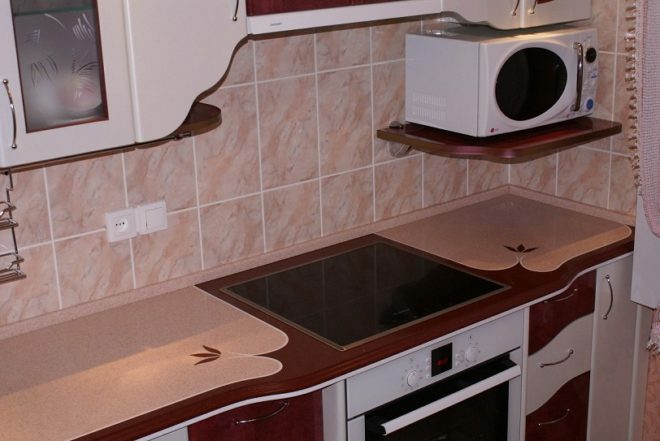
The most affordable option is chipboard. It is made from many layers of paper, firmly glued to each other and covered with plastic for better performance. It is worth remembering that the seams are afraid of moisture, so make sure that the joint with the sink is well worked out with a sealant.
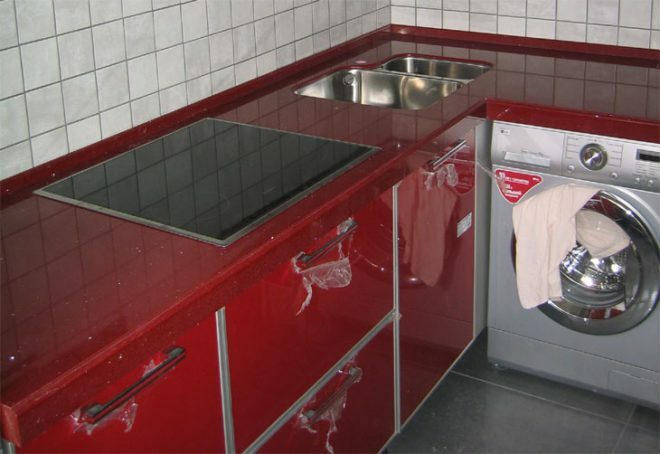
Color and shape
Of course, the choice of color and shape of the countertop depends primarily on the design of the room and the kitchen itself. What color should I choose? The most popular options are two-tone facades or the color of one of the facades. It is also quite simple to choose it for the color scheme of the apron or the floor, and this allows it as a budget option (laminated chipboard imitating wood), and more expensive (natural solid wood to match the color of the floorboard or laminate).
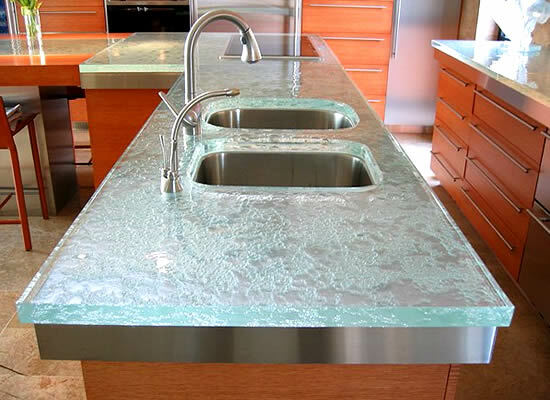
There are also a few general nuances that should be considered when planning any kitchen.
So, for countertops made of plastic (chipboard, for example), it is better to choose a dark, non-uniform color, for example, a dark wood. Over time, dark spots and circles from dishes will inevitably appear on such a surface, and this color will mask them a little. It is also better to choose a matte surface - on a glossy one, all scratches and abrasions will be striking.
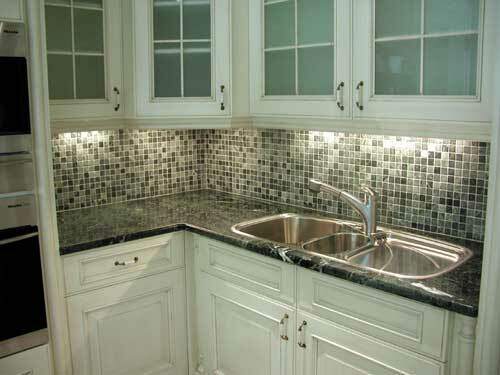
When choosing an artificial stone, give preference to one with a medium or large coating fraction (crumb inclusions) - less damage is noticeable on it.
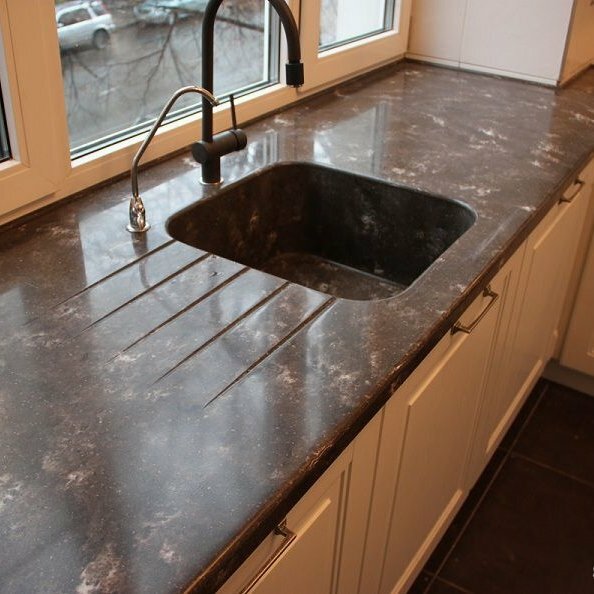
If you choose between acrylic stone and agglomerate, keep in mind that the first one has a greater number of shades and can take any shape, and only a rectangular tabletop can be made from the agglomerate.
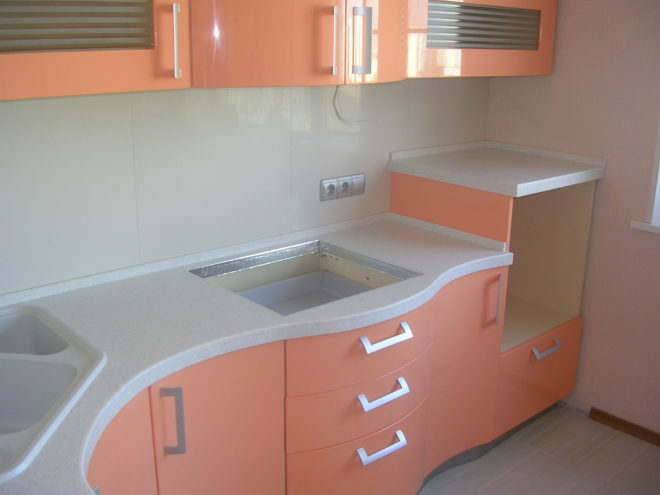
Also, when choosing a shape and layout, try not to make a lot of corners.
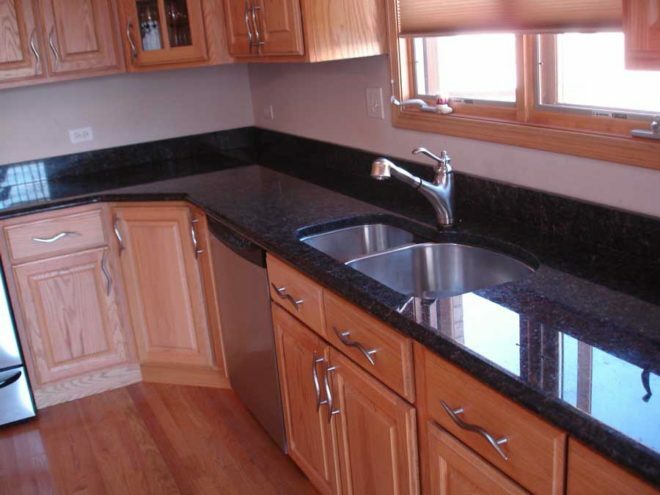
Dimensions (edit)
For the kitchen, the first important parameter when choosing a countertop will be its thickness. It usually ranges from 2 to 6 centimeters. The thicker it is, the stronger it will be, but the more expensive it will be. It should be borne in mind that if the material is made of stone, then the thicker it is, the heavier it is. This means that it will be necessary to strengthen the cabinets and facades - they must withstand the serious weight of the coating.
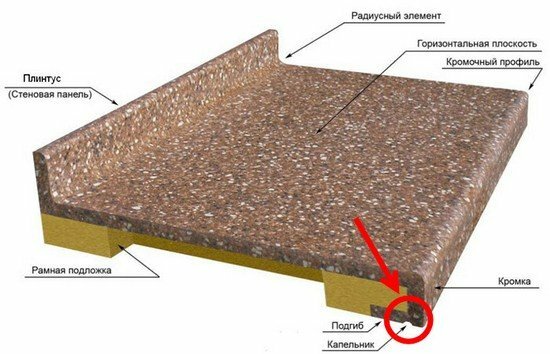
The width should be a couple of centimeters wider than the width of the cabinet, then the handles and decorative elements of the cabinets will not cling to clothes.
The length of the table top is always individual, however, some materials have a maximum length of the canvas. Long lengths will inevitably lead to the formation of seams and joints. This should be taken into account when designing a long work surface. For example, a stone is seamless at any length, ideal for a long table top, and the agglomerate can be no more than 3 meters.
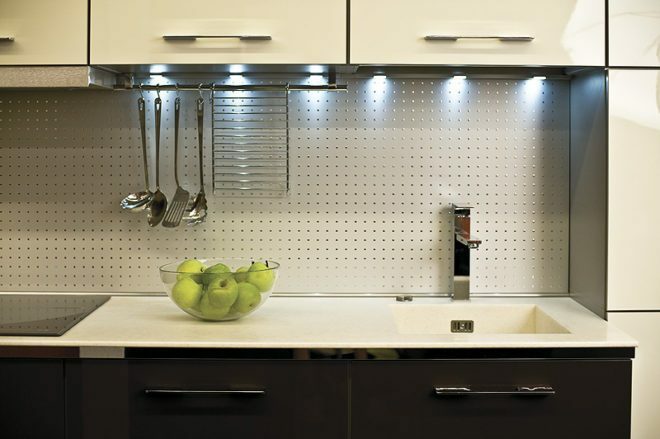
Care of the product
In order for the countertop to delight you with its original appearance for a long time, it is important not only to know how to choose it correctly for the kitchen, but also to properly care for it. Try not to use abrasives on laminated and plastic surfaces, and do not scrub them with a hard sponge. It is better to wipe with a product with special chemistry, and then rinse everything off with a damp cloth. But it is better not to clean natural wood with chemistry. To prevent it from absorbing the composition, simply wipe it with water.
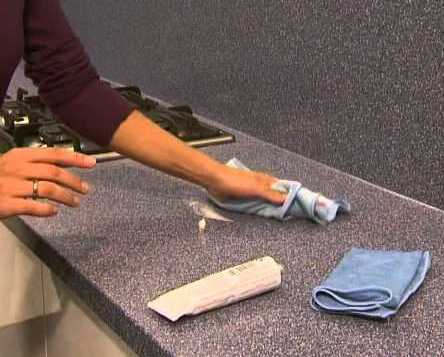
On chipboard, try not to pour water or leave puddles, especially at the edge of the sink. The tree needs to be periodically treated with special oils. And countertops made from natural stone and agglomerate can sometimes be sanded to restore their shine and smoothness.
average rating 0 / 5. Number of ratings: 0
No ratings yet. Be the first to rate.
